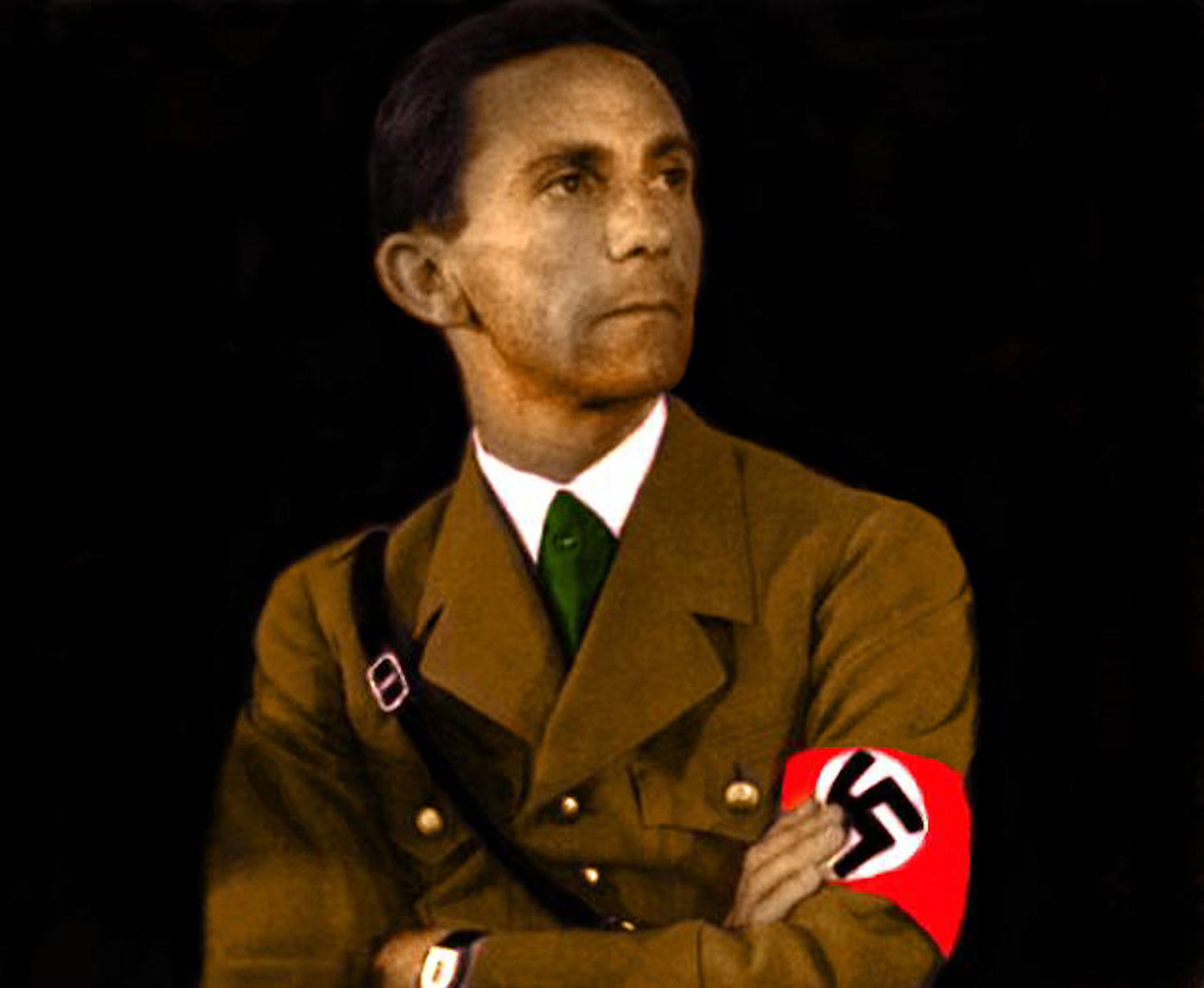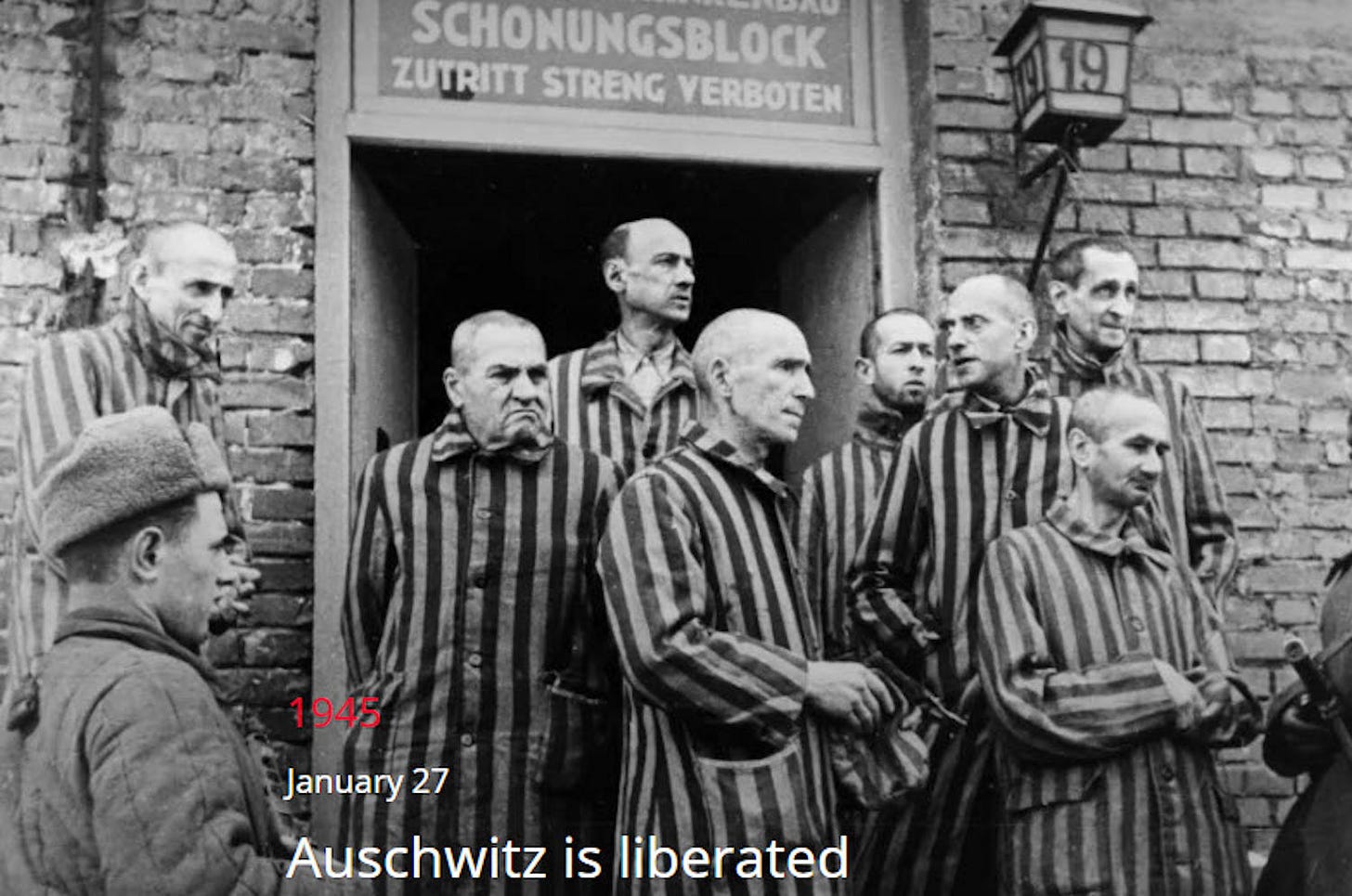LYING, PROPAGANDA, THE BIG LIE, MEET THE CREATOR
On This Day in 1945, Auschwitz Was Liberated And The Greatest Crime Against Humanity Began Unfolding
What others have said
If people in the media cannot decide whether they are in the business of reporting news or manufacturing propaganda, it is all the more important that the public understand that difference, and choose their news sources accordingly. — Thomas Sowell
Think of the press as a great keyboard on which the government can play. — Joseph Goebbels
Propaganda does not deceive people; it merely helps them to deceive themselves. — Eric Hoffer
Propaganda works best when those who are being manipulated are confident they are acting on their own free will. — Joseph Goebbels
The oblique paradox of propaganda is that the lie in the throat becomes, by repetition, the truth in the heart. — John Grierson
The most effective way to destroy people is to deny and obliterate their own understanding of their history. — George Orwell
The receptivity of the masses is very limited, their intelligence is small, but their power of forgetting is enormous. In consequence of these facts, all effective propaganda must be limited to a very few points and must harp on these in slogans until the last member of the public understands what you want him to understand by your slogan. — Adolf Hitler
Before mass leaders seize the power to fit reality to their lies, their propaganda is marked by its extreme contempt for facts as such, for in their opinion fact depends entirely on the power of man who can fabricate it. — Hannah Arendt
It would not be impossible to prove with sufficient repetition and a psychological understanding of the people concerned that a square is in fact a circle. They are mere words, and words can be molded until they clothe ideas and disguise. — Joseph Goebbels
The point of modern propaganda isn't only to misinform or push an agenda. It is to exhaust your critical thinking, to annihilate truth. — Garry Kasparov1
About
This week, we continue looking at foundations. Truth is the foundation of ethical intelligence. When we encounter lies and deception, we must be equipped to recognize the deception and discern the truth. So, we will consider the masterminds of lying and propaganda—Adolph Hitler and Joesph Goebbels. Our exploration will focus on Goebbels because he is, arguably, the creator of modern-day propaganda.
Today January 27, marks the 78th anniversary of Auschwitz’s liberation by Soviet soldiers in 1945. During the subsequent weeks and months, the world learned the extent of the crime against humanity perpetrated by the German Nazis, aided and abetted by Goebbels’s propaganda.
Lying, propaganda, the BIG lie
The Auschwitz liberation image shows the aftermath of lying and propaganda. Lies not only steal human freedom but also destroy human dignity and, ultimately, human life. Within the remainder of this article, I hope to impress upon you the slow tyranny resulting from lies and propaganda and how it enslaved Germany, a country populated by a smart, educated, and discerning populace.
As I lay out Joseph Goebbels’s propaganda postulates and axioms, I urge you to think deeply about what you read and see if you discern the propaganda pattern currently unfolding in current society, especially within the United States. Tyrants around the world have adopted and improved the Goebbels playbook for deceiving an entire populace and leading that populace to the ruinous condition in which Germany found itself in 1945.
Goebbels was famous for his alleged comment, as follows: (emphasis added)
If you tell a lie big enough and keep repeating it, people will eventually come to believe it. The lie can be maintained only for such time as the State can shield the people from the political, economic, and/or military consequences of the lie. It thus becomes vitally important for the State to use all of its powers to repress dissent, for the truth is the mortal enemy of the lie, and thus by extension, the truth is the greatest enemy of the State.2
There is a minor controversy about the true author of this quote. Many believe they have found the same material embedded within Hitler's Mein Kampf. Goebbels was an ardent admirer of Hitler and made a point of extolling the content of Mein Kampf. So, it may be that Goebbels simply expropriated the content and put it into the quoted form. There is no doubt, however, that Adolf Hitler greatly influenced Goebbels in creating his propaganda portfolio.
After the war, we discovered that the Germans maintained meticulous records of their activities during the war. Included in those records was a treasure trove of materials allegedly written by Joseph Goebbels, including what seemed like a diary. Apparently, at the end of every day, Goebbels would sit and write a synopsis of his daily activities. All 6,800 pages of Goebbels’s “diary,” were analyzed by Leonard Doob, who served as Policy Coordinator of the Overseas Branch of the Office of War Information during World War II.
Out of those 6,800 pages of material, Doob distilled the following “postulates and axioms” of Goebbels’s propaganda portfolio, the Playbook (emphasis added).
Goebbels’s Propaganda Playbook
Propagandists must have access to intelligence concerning events and public opinion.
Propaganda must be planned and executed by only one authority.
It must issue all propaganda directives.
It must explain propaganda directives to important officials and maintain their morale.
It must oversee other agencies’ activities which are propaganda consequences.
The propaganda consequences of an action must be considered in planning that action.
Propaganda must affect the enemy's policy and action.
Declassified, operational information must be available to implement a propaganda campaign.
To be perceived, propaganda must evoke the interest of the audience and must be transmitted through an attention-getting communications medium.
Credibility alone must be determined whether propaganda output should be true or false.
The purpose, context, and effectiveness of enemy propaganda; the strength and effects of an exposé; and the nature of current propaganda campaigns determine whether enemy propaganda should be ignored or refuted.
Credibility, intelligence and the possible effects of communicating determine whether propaganda material should be censored.
Material from enemy propaganda may be utilized in operations when it helps diminish that enemies prestige or lend support to the propagandists on an objective.
Black rather than white propaganda must be employed when the latter is less credible or produces undesirable effects.
Propaganda may be facilitated by leaders with prestige.
Propaganda must be carefully timed.
Propaganda must label events and people with distinctive phrases or slogans.
They must evoke desired responses which the audience previously possesses.
They must be capable of being easily learned.
They must be utilized again and again, but only in appropriate situations.
They must be boomerang proof.
Propaganda to the home front must prevent the raising of false hopes which can be blasted by future events.
Propaganda to the home front must create an optimum anxiety level.
Propaganda must reinforce anxiety concerning the consequences of defeat.
Propaganda must diminish anxiety (other than that concerning the consequences of defeat) which is too high and which cannot be reduced by people themselves.
Propaganda to the home front must diminish the impact of frustration.
Inevitable frustrations must be anticipated.
Inevitable frustrations must be placed in perspective.
Propaganda must facilitate the displacement of aggression by specifying the targets for hatred.
Propaganda cannot immediately affect strong counter tendencies; instead it must offer some form of action or diversion, or both.3
Goebbels was agnostic about the content of his propaganda. It didn't matter whether it was the truth, a bald-faced lie, or something in between. The objective was effectiveness. Here is an excerpt of a speech Goebbels presented in 1928 as the Nazi party was still in its formative stage. (emphasis added)
Propaganda shows that it is good if over a certain period it can win over and fire up people for its idea. If it fails to do so, it is bad propaganda. If propaganda wins the people it wanted to win, it was presumably good, and if not, it was presumably bad. No one can say that your propaganda is too crude or low or brutal, or that it is not decent enough, for those are not the relevant characteristics. Its purpose is not to be decent, or gentle, or weak, or modest; it is to be successful.4
Nazi Germany serves as a case study demonstrating the destructive power of lies. Through the use of propaganda, built mostly on a foundation of lies, Hitler and Goebbels transformed a society like never before. That society became one of the greatest instruments of destruction the world has ever seen—most of Europe was destroyed and tens of millions died.
Enhanced lying and propaganda continue
Unfortunately, it seems the world learned nothing from the Nazi German experiment. Tyrants throughout the world have continued improving the efficacy and effectiveness of lying and propaganda, with the Soviet Union experience that ended in 1989, being yet another informative case study. Vaclav Havel called this the post-totalitarian approach. (emphasis added)
The post-totalitarian system touches people at every step but it does so with its ideological gloves on. This is why life in the system is so thoroughly permeated with hypocrisy and lies: government by bureaucracy is called popular government; the working class is enslaved in the name of the working class; the complete degradation of the individual is presented as his or her ultimate liberation; depriving people of information is called making it available; the use of power to manipulate is called the public control of power; and the arbitrary abuse of power is called observing the legal code; the repression of culture is called its development ...
Because the regime is captive to its own lies, it must falsify everything. It falsifies the past. It falsifies the present, and it falsifies the future. It falsifies statistics. It pretends not to possess an omnipotent and unprincipled police apparatus. It pretends to respect human rights. It pretends to persecute no one. It pretends to fear nothing. It pretends to pretend nothing.
Individuals need not believe all these mystifications, but they must behave as though they did, or they must at least tolerate them in silence, or get along well with those who work with them. For this reason, however, they must live within a lie. They need not accept the lie. It is enough for them to have accepted their life with it and in it. For by this very fact, individuals confirm the system, fulfil the system, are the system.5
A society based on lies must eventually collapse.6
The greatest Philosopher to ever live once asked the question, "Having eyes, do you not see? And having ears, do you not hear?" (Mark 8:18, NKJV) I sincerely hope your answer to that question when posed against what I have just presented in this article is a resounding YES! Think about what is happening around the world, especially in the United States. I hope you see the parallels I see.
LIES STEAL FREEDOM AND DESTROY LIVES AND SOCIETIES!
Next week, we will continue the journey.
Remember, you cannot lie and be ethically intelligent.
Until then, Shalom!
References
Unless otherwise noted, quotations are taken from A-Z Quotes, Goodreads, and Brainy Quotes.
Jewish Virtual Library. (2023). Joseph Goebbels: On the “Big Lie”. American-Israeli Cooperative Enterprise. https://www.jewishvirtuallibrary.org/joseph-goebbels-on-the-quot-big-lie-quot
Doob, L. W. (1950). Goebbels' Principles of Propaganda [Article]. Public Opinion Quarterly, 14(3), 419-442. https://doi.org/10.1086/266211
Goebbels, J. (1934). Erkenntnis und Propaganda. Signale der neuen Zeit. 25 ausgewählte Reden von Dr. Joseph Goebbels 28-52. https://research.calvin.edu/german-propaganda-archive/goeb54.htm
Havel, V. (1985). The Power of the Powerless: Citizens Against the State in Central-eastern Europe. M. E. Sharpe.
Furnell, G. (2022). Vaclav Havel on Defying a System of Lies [Book Review]. Quadrant Magazine, 66, 75-78.
January 24, 2023, Volume 3, Issue 1





